What are good hook examples to get my creative writing inspiration flowing? Many elements go into an effectively written piece of work. Using these elements to your advantage will help you write better essays, assignments, articles, stories, and more. The hook is one of these elements. It is what “hooks” the reader onto your work. The skill to write a compelling hook will decide whether people want to read your writing or not.
Learn about hooks and see examples in this comprehensive guide…
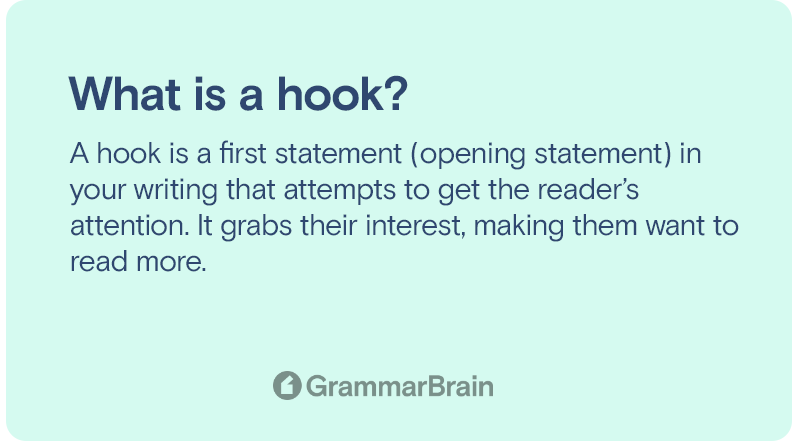
What Is Hook?
A hook is a first statement (opening statement) in your writing that attempts to get the reader’s attention. It grabs their interest, making them want to read more.
In essence, make your hook catchy. Readers should be motivated to continue reading the whole piece.
To achieve this, read your material multiple times and understand the central theme. The hook must follow that theme. It cannot be random for the sake of being catchy.
For making your hooks catchy, there are multiple things at your disposal. Use humor, state relevant and shocking facts, ask rhetorical questions or borrow a famous quote to develop good hooks.
Hook Examples
As mentioned earlier, there are multiple types of hooks. Choose the type that best suits the written material based on the nature of your essay or article.
In a nutshell, hooks come in 5 varieties – Sentences, Questions, Story Openings, Facts or Statistics, and Quotations.
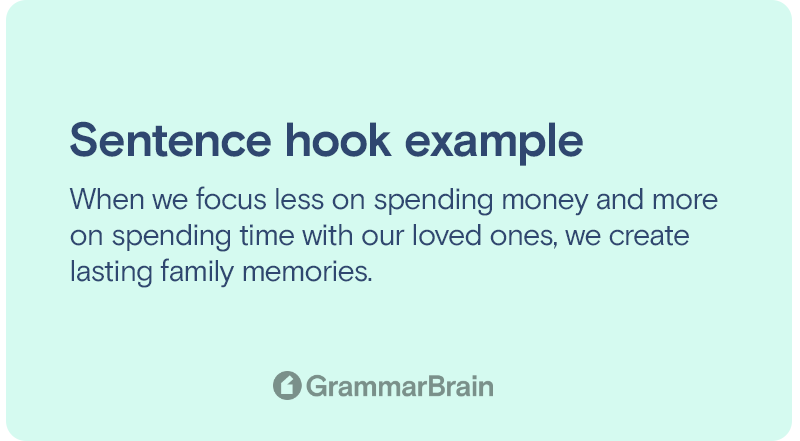
Sentence Hook Examples
Start your article with a convincing opening statement or sentence. The first sentence will act as your hook if it is sensational or catchy enough. When you make a strong statement, you create a powerful impression on the reader.
Whether the reader agrees or disagrees with you is not the question. If they find your statement compelling, the readers will be intrigued to learn more about what you have to say. It will make them read your article or essay.
Here are some excellent sentence hook examples:
- When we focus less on spending money and more on spending time with our loved ones, we create lasting family memories.
- Modern families can achieve food security by growing a vegetable garden in these unpredictable times.
- When you bring a pet home, you also positively impact your safety, happiness, and health.
- A gig economy can be brutal unless you are willing to master the art of living to work rather than working to live.
- Traveling to other places, meeting new people, and experiencing new cultures inspire people to view the world from a new perspective.
- For the people of Washington, DC, paying federal income tax despite the lack of federal government representation is a sad reality.
- Wildfires engulf the forests of California each year, burning down many houses and leaving burnt patches of once-fertile land in their wake.
- A foster child’s complaint is not about going to school every day but having to change their homes and family frequently.
- The United States of America has topped another list. But it is no cause for celebration as an average American consumes 25 teaspoons of sugar daily, making the US a world leader in added sugar consumption per capita.
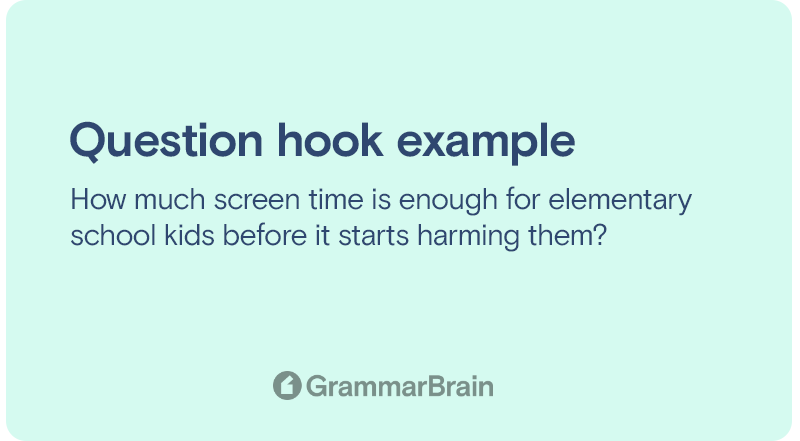
Question Hook Examples
If you do not wish to assert yourself, ask the readers a question instead. People instinctively feel the need to respond when posed with a question, even if it is through writing.
But how do you hook the readers through a question? The trick lies in balancing the overall message of your work with a relatable but thought-provoking question.
Pose a question that is connected to your written material and triggers a reader’s curiosity. Ask a shocking, probing, or universal question whose answer a reader wants.
Here are some question hook examples for your reference:
- How much screen time is enough for elementary school kids before it starts harming them?
- How important are SEO (Search Engine Optimization) strategies for budding and existing YouTubers?
- Will the presidential election see a record-breaking voter turnout this year?
- If commercial or RTE (Ready To Eat) food goes out of stock for a prolonged period, will your family manage to eat well?
- Are online classes a comparable alternative to attending school?
- Do degree-based jobs offer more potential to earn than skill-based trades?
- Do you know the likelihood of women suffering from depression is twice that of men?
- How much junk food do you eat in a day?
- Are your poor sleeping habits preventing you from feeling fresh in the morning?
- Would you be able to perform your daily activities if you suffered from never-ending chronic joint pain?
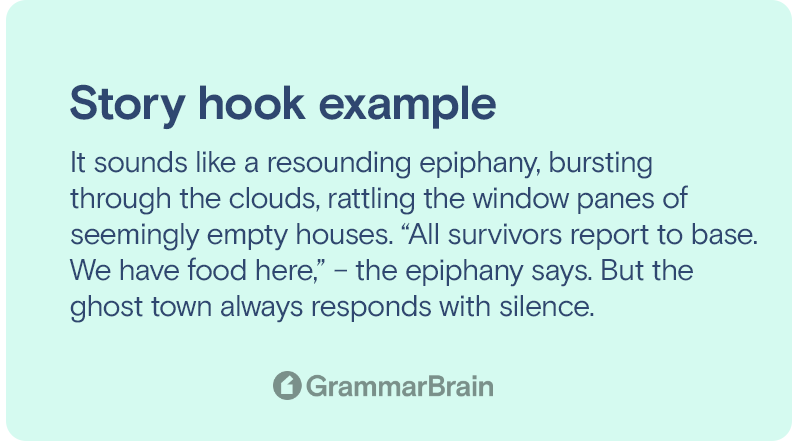
Story Hook Examples
A hook is as important in fiction as it is in non-fiction writing. Without a good opening, your story will begin with a rocky start. In the worst-case scenario, readers may not even finish the first paragraph before picking up another story (with a much better hook, presumably).
In short, a story hook creates questions, triggers curiosity, and promises a satisfying read.
Here are some story hook examples:
- It sounds like a resounding epiphany, bursting through the clouds, rattling the window panes of seemingly empty houses. “All survivors report to base. We have food here,” – the epiphany says. But the ghost town always responds with silence.
- This is not how she had imagined her date. It was Valentine’s, the festival of red. But she’d rather wear that color than wash it off her hands after examining the murdered victim with her forensics team.
- Around 50 people had gathered around Tom. Some of them were shouting, some were shrieking. It was all gibberish to Tom’s ears, who stood far atop the derelict bridge, looking down at the cliff under his feet.
- I like to play with my food. Today they gave me peas with mashed potato. The potato still had lumps, so I made small potato balls and arranged them with the peas. When the master likes my work, he gives me two meals daily.
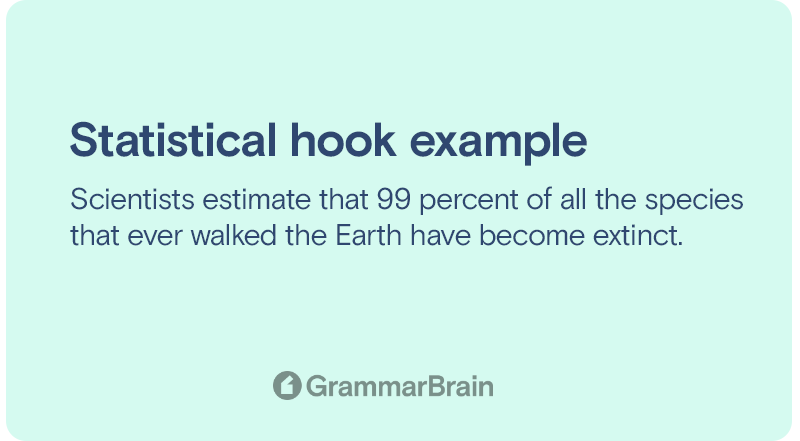
Statistical or Factual Hook Examples
Honesty is often the best policy. Statistical or factual hooks represent this notion.
Instead of writing something clever, witty, shocking, or sentimental, hit your readers with essential facts from the get-go.
Interesting insights and facts relevant to the article can make a reader interested in gaining more knowledge. This method is particularly useful for essays, reports, and articles. But even stories can begin with a fact, depending on how to paraphrase it.
Here are some statistical hook examples:
- Scientists estimate that 99 percent of all the species that ever walked the Earth have become extinct.
- 43 to 54 percent of pilots confess they have fallen asleep while flying. A third of them reported waking up next to a sleeping co-pilot.
- Posts on Twitter will likely get 35 percent more retweets if they include a picture.
- Roughly 80 percent of the males born in the Soviet Union in 1923 died in the Second World War.
- Around 28 percent of the IT sector employees never tell their friends and family about it for fear of being requested to fix their computers.
Quotation Hook Examples
Lastly, using someone else’s quote is an exciting way to write a hook. The quote need not be famous. However, when you look for a quote, ensure it is interesting and related to your written material.
Pick the quote you like. The quote can be from an article, movie, speech, interview, etc.
Assertion Sources – Cite Them Properly
When it comes to statistical/factual hooks and quotation hooks, pay special attention to the following:
- Always state the information or quote accurately. Reconfirm and revise it to avoid grammatical or typographical errors.
- After stating the information or quote, cite the sources if it is a quotation, and mention who said it and where they said it. If it is a statistic, mention the original source (research paper, article, etc.).
FAQs
Can the hook come at the end?
No, the hook must appear in the beginning. Otherwise, it will not manage to grip the reader.
How many types of hooks are there?
There are 5 types of hooks – statements, questions, statistical, quotation and story.
Is the title a hook?
Definitely! Your title should be as catchy as the first statement of your written material.
Inside this article
Fact checked:
Content is rigorously reviewed by a team of qualified and experienced fact checkers. Fact checkers review articles for factual accuracy, relevance, and timeliness. Learn more.
Core lessons
Glossary
- Abstract Noun
- Accusative Case
- Anecdote
- Antonym
- Active Sentence
- Adverb
- Adjective
- Allegory
- Alliteration
- Adjective Clause
- Adjective Phrase
- Ampersand
- Anastrophe
- Adverbial Clause
- Appositive Phrase
- Clause
- Compound Adjective
- Complex Sentence
- Compound Words
- Compound Predicate
- Common Noun
- Comparative Adjective
- Comparative and Superlative
- Compound Noun
- Compound Subject
- Compound Sentence
- Copular Verb
- Collective Noun
- Colloquialism
- Conciseness
- Consonance
- Conditional
- Concrete Noun
- Conjunction
- Conjugation
- Conditional Sentence
- Comma Splice
- Correlative Conjunction
- Coordinating Conjunction
- Coordinate Adjective
- Cumulative Adjective
- Dative Case
- Determiner
- Declarative Sentence
- Declarative Statement
- Direct Object Pronoun
- Direct Object
- Diction
- Diphthong
- Dangling Modifier
- Demonstrative Pronoun
- Demonstrative Adjective
- Direct Characterization
- Definite Article
- Doublespeak
- False Dilemma Fallacy
- Future Perfect Progressive
- Future Simple
- Future Perfect Continuous
- Future Perfect
- First Conditional
- Irregular Adjective
- Irregular Verb
- Imperative Sentence
- Indefinite Article
- Intransitive Verb
- Introductory Phrase
- Indefinite Pronoun
- Indirect Characterization
- Interrogative Sentence
- Intensive Pronoun
- Inanimate Object
- Indefinite Tense
- Infinitive Phrase
- Interjection
- Intensifier
- Infinitive
- Indicative Mood
- Participle
- Parallelism
- Prepositional Phrase
- Past Simple Tense
- Past Continuous Tense
- Past Perfect Tense
- Past Progressive Tense
- Present Simple Tense
- Present Perfect Tense
- Personal Pronoun
- Personification
- Persuasive Writing
- Parallel Structure
- Phrasal Verb
- Predicate Adjective
- Predicate Nominative
- Phonetic Language
- Plural Noun
- Punctuation
- Punctuation Marks
- Preposition
- Preposition of Place
- Parts of Speech
- Possessive Adjective
- Possessive Determiner
- Possessive Case
- Possessive Noun
- Proper Adjective
- Proper Noun
- Present Participle
- Prefix
- Predicate



